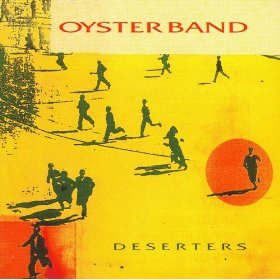 Contrary to what the liner notes in the recent Pearls from the Oysters compilation suggest, the finest period in the Oysterband’s long and illustrious history was the 3-CD arc that began with Deserters and culminated in The Shouting End of Life . The Shouting End of Life , the last of the three, is the most bitter of the lot. Holy Bandits , its predecessor, is the angriest. And Deserters ? It is, for lack of a better word, the bravest of the trio. It’s defiant without being vitriolic, proud without being arrogant and energetic without being enraged.
Contrary to what the liner notes in the recent Pearls from the Oysters compilation suggest, the finest period in the Oysterband’s long and illustrious history was the 3-CD arc that began with Deserters and culminated in The Shouting End of Life . The Shouting End of Life , the last of the three, is the most bitter of the lot. Holy Bandits , its predecessor, is the angriest. And Deserters ? It is, for lack of a better word, the bravest of the trio. It’s defiant without being vitriolic, proud without being arrogant and energetic without being enraged.
Perhaps the key element of the disc’s success is John Ravenhall’s production work. He streamlines the band’s sound and gives it depth, as opposed to the immediate, almost live feel of earlier efforts like Ride . This effect is readily apparent on “The Deserter,” the second track on the CD, with its rifle-shot snare drum beats and thumping bass. While “All That Way For This,” the opening song, could conceivably have come from any of a half-dozen Oysters discs, “The Deserter” announces loud and clear that this is a new sort of Oysterband sound, one dependent on full-blown, meticulously arranged songs, not sparsely orchestrated tunes.
Another one of Deserters ‘ strength is its reliance on original material. The sole cover is the furious version of “Bells of Rhymney” which closes the disc (though the later cover on Trawler pushes that approach even further, with its defiant cry of “Bastards!”), while the rest explores the range of songs the band itself can devise. From the stubborn pacifism of “Fiddle or a Gun” to the snide commentary on consumerism in “Elena’s Shoes,” from the wistful romanticism of “We Could Leave Right Now” to the almost feckless optimism of “Granite Years,” Deserters shows off an impressive range of moods while presenting unified musical themes. It’s a strong, tight album, one that feels coherent from first listen to fiftieth. While it may not be the Oysters’ finest, I’d be willing to argue the point — after popping the disc in the CD player again, of course.
(Rykodisc, 1992)
